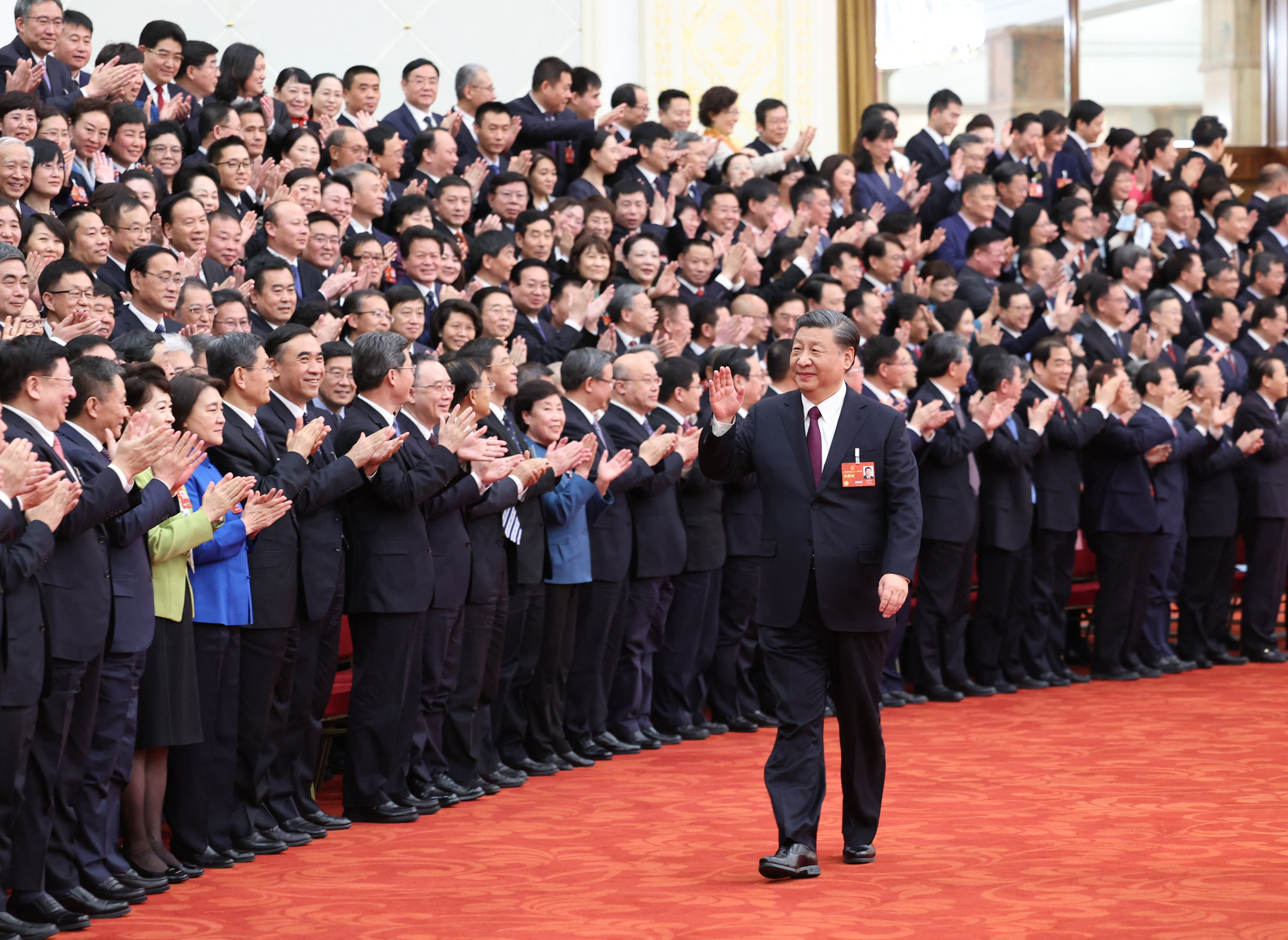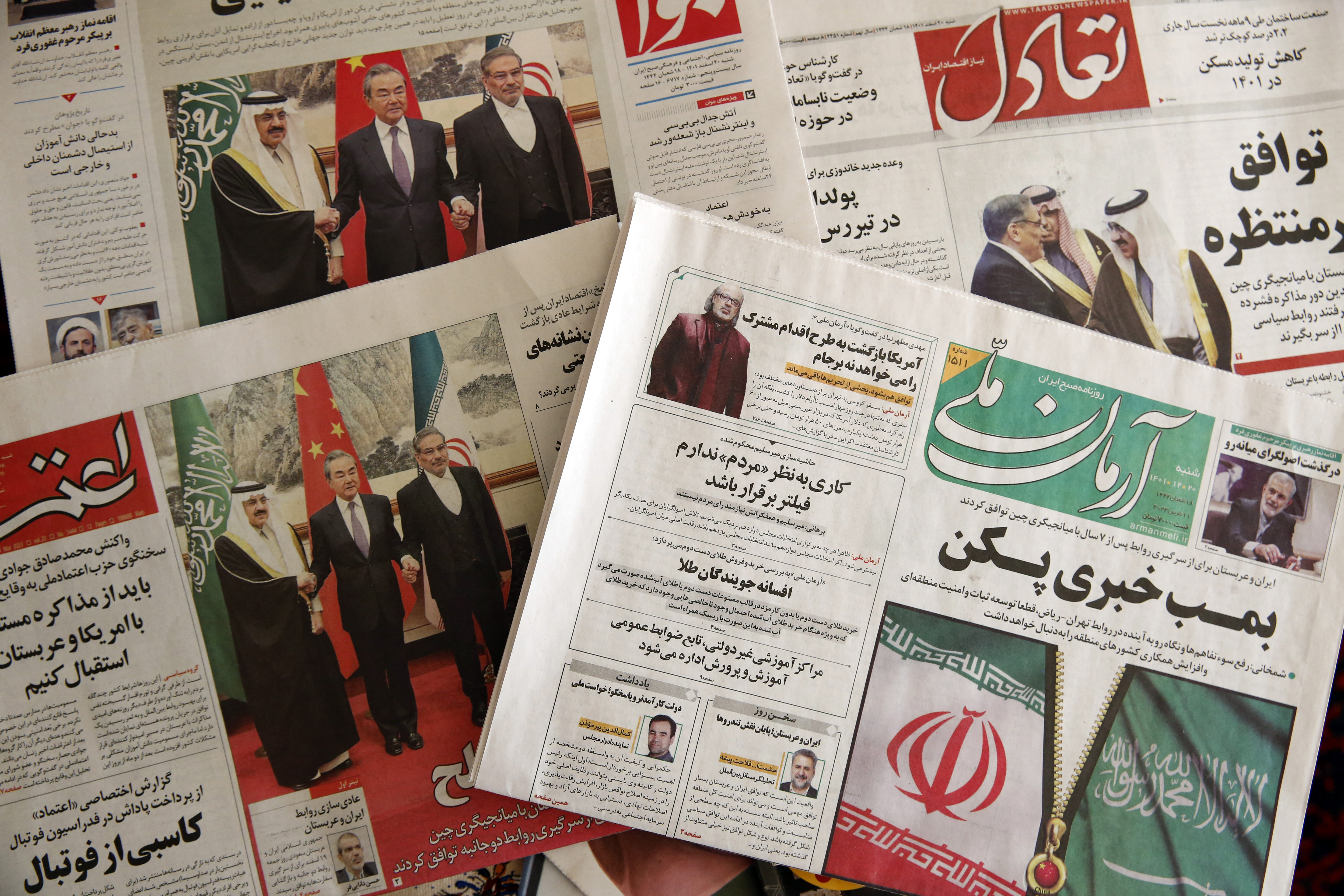When Xi Jinping spoke to the Two Sessions (两会 Liang hui) of the National People’s Congress (the national legislature) and the Chinese People’s Political Consultative Assembly (the political advisory body) in March, he emphasized the security challenges that threaten China’s sustained economic development. “Western countries led by the US have implemented comprehensive containment (全方位的遏制 quan fangwei de ezhi), encirclement (围堵 weidu) and suppression (打压 daya) against us, bringing unprecedented severe challenges to our country’s development.” The fact that he mentioned the US by name elicited outrage in America, even though the US continuously accuses China by name of any number of illicit practices.
Statements by G-7 leaders in Hiroshima in May seemed to corroborate Xi’s warning. Rishi Sunak called China “the greatest challenge of our age” (despite the all-out Russian aggression in Ukraine). They condemned a “disturbing rise” of the “weaponisation of economic vulnerabilities” by China in the form of “economic coercion” and proposed the coordination of multilateral export controls to prevent Chinese access to advanced technology. They alleged that China’s “coercion” seeks to “undermine the foreign and domestic policies and positions of G7 members as well as partners around the world”, citing Chinese economic retaliation against South Korea for installing a US missile defense system, against Australia for criticism and against Lithuania for allowing Taiwan to establish a de facto embassy there as examples.

For the EU, China is simultaneously “a partner for cooperation and negotiation, an economic competitor and a systemic rival”; for the US China is a “strategic competitor” and a “strategic challenge.” The US pushes for “de-coupling” as a strategy to reduce economic interdependence with China and to isolate China from access to advanced technology, but the EU advocates “de-risking.”
Ursula Von der Leyen has said that the EU’s relationship with China “is unbalanced and increasingly affected by distortions created by China’s state capitalist system”, requiring the EU “to rebalance this relationship on the basis of transparency, predictability and reciprocity” and “to ensure that our trade and investment relations promote prosperity in China and in the European Union.” She calls upon the EU “to recognize that the world and China have changed significantly in the last three years” and sees areas “where trade and investment poses risks to our economic and national security, particularly in the context of China’s explicit fusion of its military and commercial sectors” such as “sensitive technologies, dual-use goods or even investment which comes with forced technology or knowledge transfers”. As a result, for the EU, “after de-risking through diplomacy – the second strand of our future China strategy must be economic de-risking.” The EU also seeks “strategic autonomy” because its own interests do not always coincide with those of the US.
At a parallel encounter to the Two Sessions, Xi used 24 Chinese characters outline his proposed policy for international action: 沉着冷静、保持定力,稳中求进、积极作为, 团结一致、敢于斗争 (chenzuo lengjing, baochi dingli, wen zhong qiu jin, jiji zuowei, tuanjie yizhi, ganyu douzheng) “stay calm, remain determined, seek to achieve progress in a stabilized environment, proactively achieve results, stay united, dare to struggle.” Xi’s use of 24 characters is significant because Deng Xiaoping had formulated his foreign policy in 24 characters as well: 冷静观察,稳住阵脚,沉着应付,韬 光养晦, 善于守拙,决不当头 (lengjing guancha, wenzhu zhenjiao, chenzhuo yingfu, taoguang yanghui, shanyu shouzhuo, jue bu dangtou) “observe calmly, hold your ground, deal with it calmly, hide your strengths and bide your time, be good at defending one’s weaknesses, and never take the lead.” Xi’s version accords well with his proposal to the National Party Congress in 2019 that China should take center stage in world affairs.
Mathieu Duchâtel interprets Xi’s policy to mean that “a threat perception centered on Western containment of China” leading to “a foreign policy doctrine that emphasizes calm, determination, stability and unity” suggests “a vision of an incremental transformation of the international order cautious of avoiding counterproductive overreaction or premature risky behavior, rather than an intention to take immediate action in East Asia, à la Putin.”
Our policies towards China need to change because China is changing.
Decoupling from China is neither viable nor in our interest.
Leaders united behind the idea of de-risking, but not decoupling ↓
— Ursula von der Leyen (@vonderleyen) May 19, 2023
Duchâtel cites Chinese advisers who analyze US policy as “Susan Strange’s ‘structural power’ concept [put] into practice” in an attempt “to shape the international political economy architecture”. Strange defines this as the ability to “shape and determine the structures of the global political economy within which other states, their political institutions, and their economic enterprises and … their scientists and other professional people have to operate.” For them, “the Biden administration is building a structural network from which China is excluded, and inside which the US plays the central organizing role”. In order to avoid this trap, they propose that “China needs to loosen the pressure by going around the US containment policy, expanding where there is space to expand, like water”.
While NATO plays international relations like a game of chess, China is playing them like a game of Go (围棋 weiqi). Chess pursues the elimination of pieces; Go pursues the encirclement of territory. As Han Yong Hong reported, four days after Xi denounced a US-led containment assault on China’s development, “an even more pivotal development occurred: following China’s mediation, archrivals Saudi Arabia and Iran agreed to re-establish diplomatic ties, creating a major breakthrough in the geopolitics of the Middle East”.
For years now China has been developing relations with “the Global South”, building economic interdependence with countries in the Indo-Pacific, in Latin America, in Africa, in Central Asia, and now in the Middle East. China has also put forward a set of principles for ending the Russian war in Ukraine. While the G-7 leaders met in Hiroshima, China met with Central Asian countries. The Shanghai Cooperation Organization promoted by China brings together countries representing much more than 40 percent of the world’s population. Han suggests that by exerting influence in the Middle East, China “will help it counter pressure from the US’s Indo-Pacific strategy and the use of Taiwan as a pawn.” The budget announced at the Two Sessions includes a 12 percent increase for diplomatic expenditure, “indicating that China will be more aggressive in foreign relations as it makes up for lost time during the pandemic … it wants to expand its influence, especially in making friends outside of US allies to counter US containment.

“The world’s demographic and commercial center of gravity has shifted to Asia. Fiona Hill has identified a “deep-seated international resistance, and in some cases open challenges, to continued American leadership of global institutions” and says that “the next iteration of the global security, political and economic system will not be framed by the United States alone.” Countries representing more than 6.5 billion people have “a very clear negative reaction to the American propensity for defining the global order and forcing countries to take sides.” They see the West “dominating the international discourse and foisting its problems on everyone else, while brushing aside their priorities on climate change compensation, economic development, and debt relief”. The West is protecting its own “benefits and hegemony” while Western sanctions “[constrain] their energy and food supplies and [push] up prices”. Hill concludes that “the United States and Europe will have to engage the rest of the world in an honest conversation… and actively listen to their feedback and concerns on specific issues”.
These countries no longer share a Western perception of geopolitics that thwarts their own development. For countries that suffered from “The Washington Consensus” and suffer now from sanctions that are alien to their own circumstances, the concept of “economic coercion” may seem hypocritical. Many see the war in Ukraine as a local European problem, even though its geoeconomic consequences are global. In the past, a Pax Americana did favor developing countries, but it no longer does.
The invasion of Ukraine is a clear violation of sovereignty and territorial integrity that China can neither justify nor defend. But China cannot align itself with a US-dominated NATO that it sees as an instrument of US hegemony either. China’s equidistant stance would prefer a multilateral balance of power that favors neither NATO nor Russia. Hence China’s agreement with Russian opposition to NATO’s expansion, but not with Russia’s actions in Ukraine. China has abstained on UN resolutions critical of Russia that it could have vetoed, a stance shared by countries representing a significant portion of the world’s population that also abstained from voting on UN resolutions about the war in Ukraine.
The Irish Foreign Minister Mícheál Martin summarized the perspective of an EU member state that is neutral, not a member of NATO, that currently holds a seat on the UN Security Council, saying that the West’s “traditional understanding of the concept of security … one focused mainly on military capabilities and readiness to manage interstate conflict” must adapt to “a multi-faceted reality, which encompasses protection from pandemics, from climate crises, from violations of human rights and international humanitarian law, from economic shocks, from cyber or hybrid threats”. This involves “developing our economic and systemic resilience, to in turn protect our values and interests”, but this “does not mean turning our backs on an economic, diplomatic and cultural relationship with China”.
Seán Golden is Associate Senior Researcher at the CIDOB Barcelona Centre for International Affairs (www.cidob.org).
Cover Photo: Chinese former Foreign Minister and current Director of the Foreign Affairs Commission Office, Wang Yi, meets with NATO Secretary General Jens Stoltenberg on the sidelines of the 77th session of the UN General Assembly in New York, the United States, Sept. 22, 2022. (Xinhua/Li Rui) (Photo by Li Rui / XINHUA / Xinhua via AFP)
Follow us on Facebook, Twitter and LinkedIn to see and interact with our latest contents.
If you like our analyses, events, publications and dossiers, sign up for our newsletter (twice a month) and consider supporting our work.


